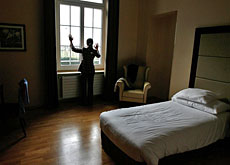
Swiss count the cost of mental illness

Brain disorders are among the most expensive illnesses in Switzerland, accounting for an estimated one sixth of healthcare costs annually, according to a study.
Zurich University researchers found that depression was the biggest burden, in what has been called the first-ever full assessment of neuropsychiatric illness costs in the country, made public on Monday.
The report, published in the latest edition of the Swiss Medical Weekly journal, found that the country’s bill for brain disorders is SFr15 billion ($13.7 billion) a year – more than SFr2,000 per person.
An estimated one fifth of the population is thought to be affected by a mental illness of some kind, said the study.
Wulf Rössler, one of the authors and professor of clinical social psychiatry at Zurich University Psychiatric Hospital, told swissinfo that mental disorders were among the most burdensome of all disease groups.
“As such it is not surprising that so much money is spent on disorders of the brain in our society,” he told swissinfo.
The most common psychiatric illnesses are anxiety disorders with 710,000 cases. Migraine leads in terms of neurological illnesses at 630,000 cases.
However, both of these are relatively “inexpensive” conditions, with anxiety disorders costing on average SFr2,700 and migraine, SFr1,700.
In comparison, a neurological disease such as a brain tumour costs SFr112,000 and another, multiple sclerosis, SFr68,000, although both are fairly rare, said the report.
All figures cover the cost of treatment and social consequences, as well as such effects as loss of work and productivity.
Depression
Depression and bipolar disorder – formally known as manic depression – are the most expensive psychiatric conditions at SFr11,000 and SFr17,000 respectively. They take a 30 per cent share of the overall neuropsychiatric expenses.
Rössler said this was because depression was such a common illness among the population.
The report nevertheless warned that the total costs related to mental disorders could be even higher.
“We estimate that about half of patients with mental disorders are not treated and as the number of people who get treated […] increases, the expense will rise as well,” Rössler explained.
He stressed, however, that there was not much evidence to suggest that mental illness itself was on the rise. But recognition of these conditions was increasing.
European comparison
Compared with its European neighbours, Switzerland – which has one of the most expensive health systems in the world and faces rising costs – seems to do well in mental health spending.
“There are only a few cases documented. Luxembourg is another small country that spends about the same amount of money for mental disorders. But other countries spend ten, 12, 14 per cent, which is considerably less than 16 per cent [in Switzerland],” said Rössler.
A reason for this is that Switzerland stigmatises neuropsychiatric problems less than other European nations, he added. “But it still does not do enough,” he added.
Rössler says the key political question is whether too much or too little money is spent on mental disorders. Money could be saved. In-patient treatment is costly.
But he prefers to highlight prevention and early recognition and treatment as bigger issues.
“For schizophrenia we know that it takes between three and five years for people to come to psychiatric in-patient treatment for the first time,” he told swissinfo.
“During that time a lot has happened not only in their illness, but also socially – most have lost their job. We have to intervene much earlier before all these harmful consequences have happened.”
swissinfo, Isobel Leybold-Johnson in Zurich
The Swiss Health Observatory reported in August 2007 that 55 per cent of the population said they felt emotionally stable, up ten per cent on 1992.
The number of people suffering from minor troubles like disturbed sleep patterns or nervous tension, as well as those with severe chronic problems dropped at the same time.
However, more people have been consulting mental health professionals. Men are also more likely to see a specialist than women. Reduced stigma, better treatment and more understanding in the medical profession are said to be the reasons.
The study found that psychiatric illnesses were overall the most costly of mental illnesses at 78 pert cent of the total costs.
The researchers also included the indirect follow-on factors in their calculations, such as accidents at work and early retirement. These amounted to 50 per cent of the overall calculations.
In- and out-patient treatment amounted to 30 per cent, with drug therapy accounting for just two per cent.
Total healthcare costs for Switzerland were not given in the study. Federal Statistics Office statistics put costs at SFr51.7 billion or 11.5 per cent of Swiss gross domestic product (GDP) in 2004.

In compliance with the JTI standards
More: SWI swissinfo.ch certified by the Journalism Trust Initiative































You can find an overview of ongoing debates with our journalists here . Please join us!
If you want to start a conversation about a topic raised in this article or want to report factual errors, email us at english@swissinfo.ch.